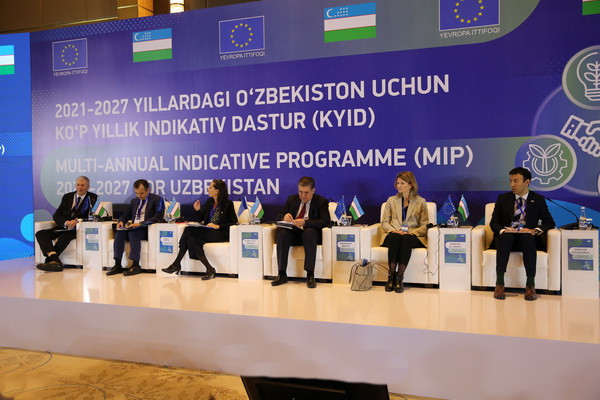
EU and Uzbekistan launched a new Multi-Year Indicative Program to enhance cooperation for 2021-2027
Tashkent, Uzbekistan (UzDaily.com) -- Today, on 10 March, a conference was held in Tashkent. to launch a new Multi-Year Indicative Program of the European Union for Uzbekistan for 2021-2027.
The Deputy Prime Minister - Minister of Investment and Foreign Trade Sardor Umurzakov and EU Commissioner for International Partnership Jutta Urpilainen addressed the participants.
The event was attended by Deputy Minister of Investment and Foreign Trade Badriddin Abidov, Ambassador of the European Union Charlotte Adrian, as well as representatives of ministries and departments of Uzbekistan, diplomatic missions of EU countries and international organizations and the media.
Uzbekistan Development Strategy 2022-2026 underlies a number of national strategies and plans that play a major role in transforming the relationship between the state and its citizens. These plans, most of which extend to 2030, aim to deliver efficient and accountable public services, transition to an open and inclusive green economy, and improve the lives of citizens. Uzbekistan fully localized the 2030 Agenda for Sustainable Development by submitting its Voluntary National Review to the UN in 2020, and also developed its Nationally Determined Contributions for the implementation of the Paris Climate Agreement, which was ratified by Uzbekistan in 2018.
During the event, key areas for further bilateral financial and technical cooperation with the European Commission were discussed as part of the next program cycle for 2021-2027.
The European side noted that under the new indicative program, at the initial stage, 83 million euros will be allocated for 2021-2024, including 76 million euros for jointly developed projects and programs of technical assistance and budgetary support, as well as 7 million euros. euro to support activities for the development of civil society and human rights.
In particular, the parties discussed the implementation of projects and activities in the areas of supporting agriculture and green growth, improving the efficiency of public administration and digitalization, including the judicial and transport and logistics systems, improving the investment climate, as well as the socio-economic development of the Aral Sea region.
During the event, the parties answered the participants' questions regarding the practical implementation of the cooperation program.